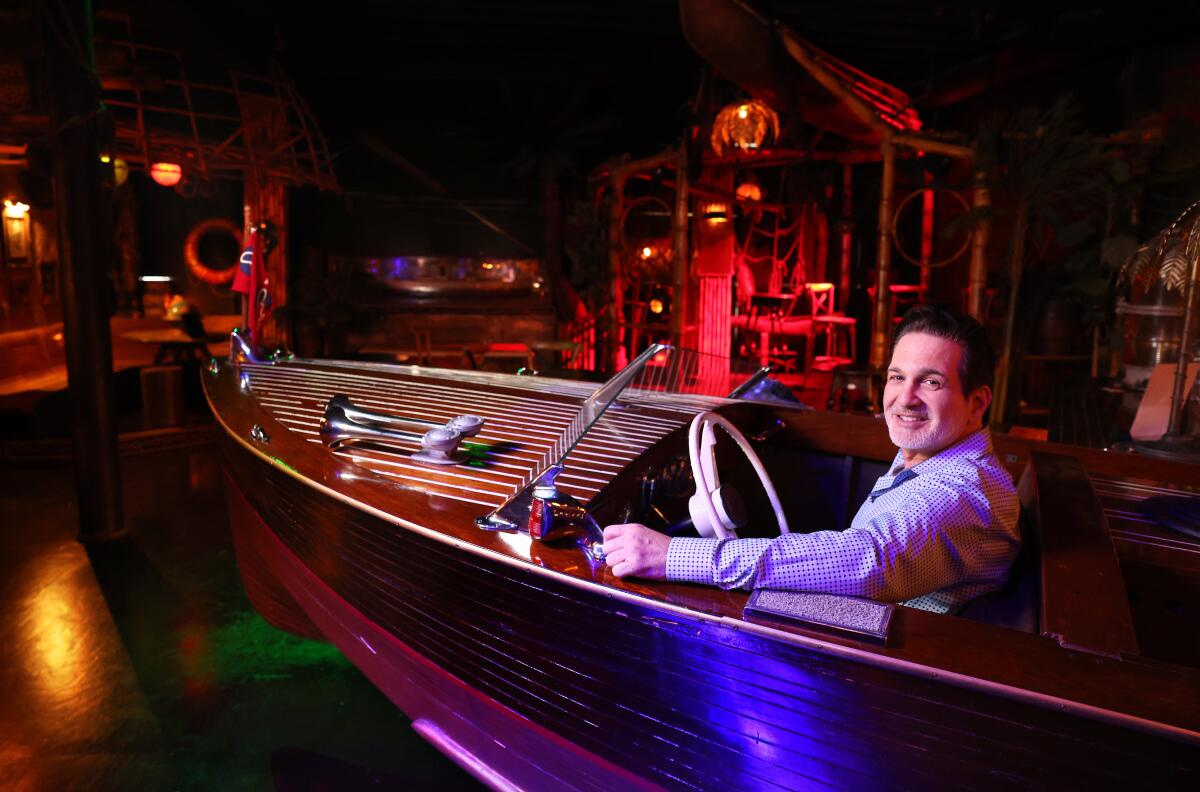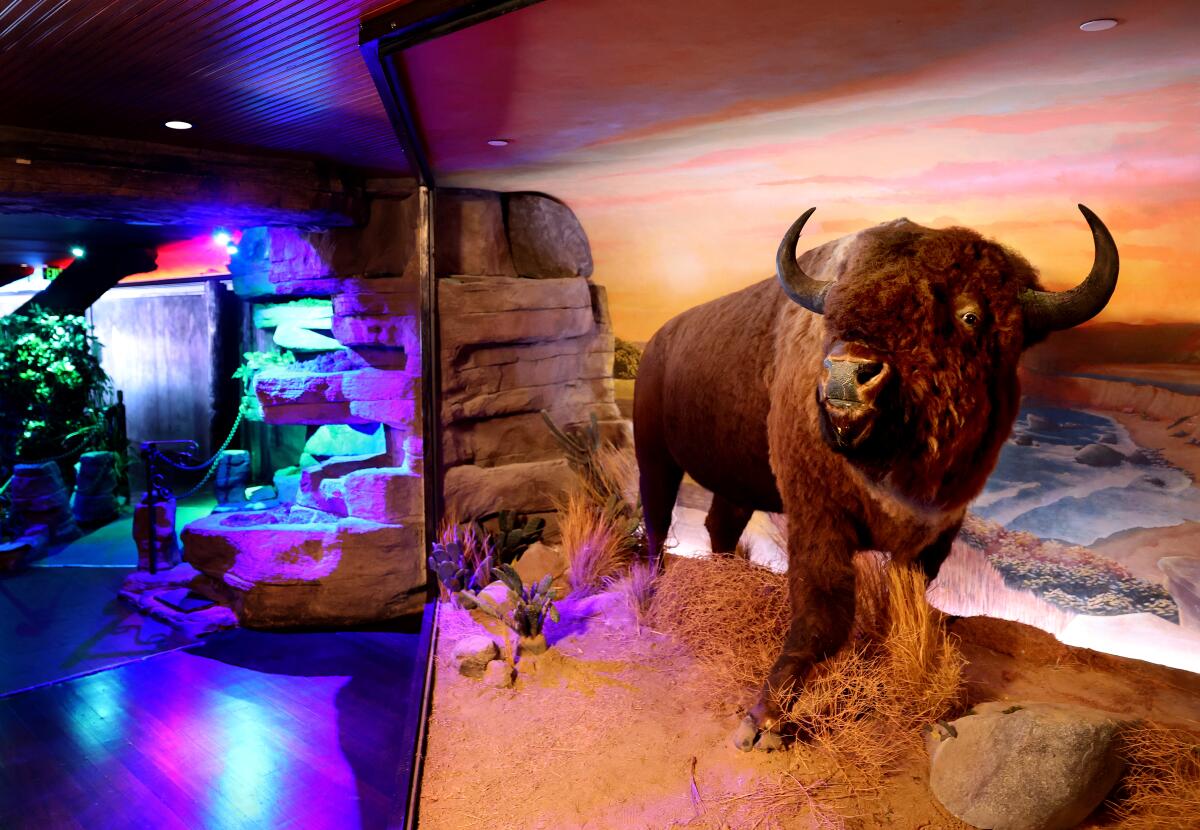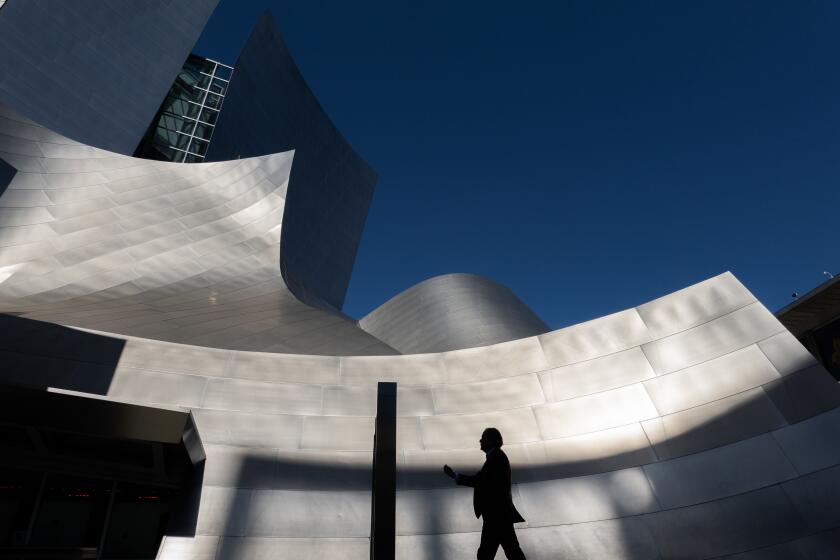Legendary Clifton’s is reopening in a struggling downtown L.A. Its owner hopes crowds return

- Share via
Andrew Meieran is about to reopen the doors of one of L.A.’s legendary restaurants in a bid to once again make it an offbeat dining and entertainment destination.
Meieran is the proprietor of Clifton’s Republic, the kitschy, forest-themed restaurant on Broadway in downtown’s Historic Core that for nearly a century served up comfort food such as pot roast, mashed potatoes and Jell-O. The five-story restaurant and bar complex has been closed for the last year after a burst water pipe caused a flood that destroyed the kitchen and collapsed the ceilings on three floors.
Clifton’s is scheduled to reopen next month after extensive repairs and renovations. Among the changes patrons will find is a basement venue several years in the making that Meieran said is “dedicated to innovation and the magic of experiences” with “entertainment, cocktails and culinary offerings.”
Andrew Meieran has ambitious vision for Clifton’s Cafeteria
Meieran is keeping details under wraps for now, but he has demonstrated a knack for creating provocative entertainment and dining venues through an obsessive attention to offbeat details, as well as a willingness to spend more money than most real estate developers to realize his vision and preserve the historic integrity of his projects.
A Bay Area transplant with a background in real estate development and filmmaking, Meieran emerged on the L.A. scene in 2007 when he opened the Edison, a subterranean nightclub he created in a former power plant deep under a century-old building on 2nd Street.
In 2010 he took over Clifton’s from the family that had operated it since the 1930s, when founder Clifford Clinton purchased the lease of the former Boos Bros. cafeteria on Broadway and set out to create a space that would evoke the coastal redwoods of the Santa Cruz Mountains, where Clinton spent summers growing up. After taking over, Meieran closed the restaurant for nearly four years for renovations and upgrades and again during the COVID-19 pandemic.
The Times spoke with Meieran to discuss his plans for reviving Clifton’s after the current shutdown, as well as his thoughts about the evolving nature of the bar and restaurant business during a time of change downtown. The interview has been edited for brevity and clarity.
Bunker Hill is primed to elevate its status as the region’s leading arts center even as the area around it struggles with persistent homelessness and post-pandemic losses of office tenants.
Since the pandemic began, the restaurant business has been battered and put through changes that have made it hard for owners to operate profitably. How do you intend to make a go of it?
People need, and I emphasize “NEED” in capital letters, to be able to disengage from their devices and balance their life with physical and social interaction with people who are there and present around them. We are catering to people who are looking for a much more interactive lifestyle and are craving physical experiences to balance the ubiquitous online presence.

Clifton’s exists in L.A.’s collective memory as a vast cafeteria in a whimsical woodland setting, but we don’t see cafeterias much anymore. Why is that? Will we get back Clifton’s as we remember it?
Cafeterias used to be the dominant form of food delivery and food service and now, with very few exceptions, it’s not. There are clear reasons for that that are understandable and reasonable — you need tons of people in a captive audience to make a cafeteria work. You need volume and you need stable, reasonable food prices that you can pass on to your guests. That’s completely absent in this era.
So what will Clifton’s include when it reopens?
It will be fully operating as a restaurant, lounge and nightlife destination that will include the Brookdale historic dining hall people remember as Forest Glen, Walt Disney’s original inspiration for Disneyland. We’ll also reopen the Monarch Bar on the second floor and the Pacific Seas “adventure bar” on the third floor. The basement will open in midsummer.
Obviously downtown has changed a lot from Clifton’s heyday in the 20th century when Broadway was L.A.’s premier shopping and entertainment district. Occupancy in office buildings, which used to provide a steady source of lunchtime customers, has dwindled substantially since the COVID-19 lockdown. What are the prospects for downtown businesses like Clifton’s?
It’s obviously a very different environment from what it was before the pandemic. People have altered their habits and patterns and businesses have responded accordingly, with some closing and others shifting their focuses. It’s a tectonic level shift, something that hasn’t happened in generations, and it’s happening very rapidly now. It was triggered initially by the pandemic but followed up by technological shifts that have altered the dining experience such as app-based ordering, touchscreens and the potentially revolutionary impact of artificial intelligence.
It’s hard for people to really recognize what’s coming next and where this is all going. Obviously that makes it difficult for a business to respond and for other people to make investments and to determine where we’re going to be in 18 months, three years or five years down the road, which is what you need in business.
A new luxury residential tower in downtown L.A. reflects an unusual disconnect: While office rentals continue to struggle, downtown as a residential center is thriving.
Downtown, because of the level of the impact and its density, is slower to respond to change than some other, more nimble communities. It’s like turning a tanker ship that doesn’t turn on a dime. It’s taking a lot more effort and concerted focus to shift its direction.
What are the odds that the Historic Core can mount a comeback?
Broadway, in particular, has all of the ingredients that make for extraordinary projects and extraordinary communities sitting here waiting for the right catalyst. It has density, historic infrastructure and buildings that have an intrinsic beauty and an intrinsic connection to guests, residents, and visitors. And it’s got the location in terms of accessibility with plenty of parking and service by transit.
More to Read
Inside the business of entertainment
The Wide Shot brings you news, analysis and insights on everything from streaming wars to production — and what it all means for the future.
You may occasionally receive promotional content from the Los Angeles Times.













